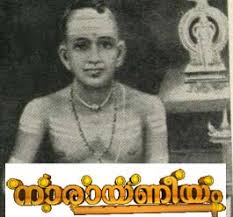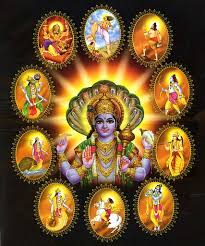DEAR ALL,
![]()

![]()
Narayaneeyam Day is celebrated at the famous Guruvayur Sree Krishna Temple in Kerala annually on the 28th day of the Malayalam month of Vrichikam. In 2013, the Narayaneeyam Day at Guruvayur Temple is on 13th December 2013.
"Narayaneeyam" is the masterly work of Melpathur Narayana Bhattatiri - A great devotee-poet who lived in Kerala during the 16th century AD. It is the condensed form of the famous Bhagavata Purana.The subject matter of the extensive Bhagavata is epitomized and recast in Narayaneeyam. The Bhagavata consisting of 18,000 verses has been summarized in this work in 1034 verses divided into 100 Dasakas (cantos). Both as a poem (Kavya) and as a devotional hymn, Narayaneeyam occupies a very high place in Sanskrit literature. Besides, unlike other hymns, it also exposes great truths of Vedanta. It is a rare literary masterpiece in Sanskrit using as many as 18 meters and using poetic devices for creating sound effects through Anuprasa, Yamaka etc and using effective use of figures of speech, puns, witticism, etc. It is also a rare hymn of devotion--probably the longest hymn in Sanskrit.
Narayaneeyam was written as an offering to Lord Vishnu after sitting in Bhajan at his lotus feet at a place called Guruvayoor in South India (Kerala).The reason for the offering was Achyuta Pisharadi, Guru of Bhattatiri fell a victim to a severe attack of paralysis and suffered unbearable pain.Bhattatiri, the devoted disciple could not bear the suffering of his Guru.He, therefore, fervently prayed that the disease may be transferred to him and his Guru freed of suffering. Bhattatiri accepted the "Karmavipaka Dana" by which the sins of his Guru were transferred to him which no one could cure.

A "Bhajanam" in the temple of Guruvayoor was considered as a sure cure for paralysis and so Bhattatiri went to Guruvayoor for 100 days of "Bhajanam" along with his younger brother, Mathrudatta. Before going to guruvayur Bhajan he met a famous Malayalam writer Tunchat Ezhuthachan for an advice and the writer advised him "to start with the fish". Bhattathiri understood the inner meaning of this advice. He wrote the famous hymn "Narayaneeyam" describing the Avatars of Vishnu starting with "fish", i.e. Matsya Avatar.
When Narayana Bhattathiri goes to Guruvayur to compose verses describing the Lord's 10 avataras, he calls upon Lord Guruvayurappan to listen his composes and verses. He narrated the incidents in each avatara and used to ask Guruvayurappan if indeed these things happened then Lord Guruvayurappan must acknowledge that Bhattathiri is right by just nodding his head. Guruvayurappan agreed for that and Bhattathiri says he will compose about 10 or 11 verses every day, and he will finish his work in 100 days. Guruvayurappan wonders if Bhattathiri is seeking to claim that even God nodded His head in appreciation of his (Bhattathiri's) verses. But Bhattathiri says he is only seeking to spread Guruvayurappan's fame, not his own. He reminds Guruvayurappan that as Lord Rama he heard Lava and Kusa narrate the Ramayana and as he did so, he nodded His head in approval. The Ramayana has 24,000 verses, so He nodded His head 24,000 times. The work Bhattathiri is proposing to write is going to have only thousand-odd verses. Can the Lord can not nod a little over a 1,000 times Bhattathiri asks. Moreover, while He heard His story as Rama, He didn't listen to the Srimad Bhagavatam that describes the Krishna avatara and if he now does not listen to Bhattathiri's work, will not the people say that the Krishna avatara is not as great as the Rama avatara, for the Lord listened to the Ramayana but did not listen to His exploits as Krishna ? Guruvayurappan then agrees to nod His head for each of Bhattathiri's verses.
During the hundred days of his Bhajanam at the temple of Guruvayoor he summarized the entire Bhagavata Purana in 1034 verses at the rate of one Dasaka (canto) consisting generally of ten verses everyday. Each Dasakam ended with a prayer to the Lord of Guruvayoor to cure him of his illness. The 100th canto composed on 28th day of the Malayalam month of Vrichikam and On the hundredth day he had a vision of the Lord in the form of Venugopala. By giving a graphic description of this form of the Lord from the head to the foot and On the same day he became completely cured of his disease.
This immortal composition, Narayaneeyam, is so named for two reasons as mentioned by the poet himself in the 100th canto. It is about Lord Narayana and secondly because it was composed by Narayana Bhattatiri. These episodes are now being presented again by yet another Narayana!

In the Srimad Bhagavata and the Vishnu Purana it is told that the nine forms of Bhakti are Sravana (hearing of God's and stories), Kirtana (singing of His glories), Smarana (remembrance of His Name and presence), Padasevana (service of His feet), Archana (worship of God), Vandana (prostration to the Lord), Dasya (cultivating the Bhava of a servant with God), Sakhya (cultivation of the friend-Bhava) and Atmanivedana (complete surrender of the self). A devotee can practise any method of Bhakti which suits him best. Through that he will attain Divine illumination.
The literal meaning of sanskrit word Sravanam is hearing or listening to the name of God, being uttered, is one of the nine types of bhakti. But in the language of the Vedas, this word means " experiencing God through sravnedriyam or the instrument of hearing.Hearing of the holy name of the Lord (sravanam) is the beginning of devotional service and the best way of worshipping God. Although any one of the nine processes is sufficient, in chronological order the hearing of the holy name of the Lord is the beginning. Indeed, it is essential.Listening is an art, and it has to be cultivated. Hearing or reading stories full of Devotion (bhakti) is very pleasing to the heart and strengthens our love and devotion. In order to enter into deeper stages of bhakti we require a profound understanding about the nature of the Lord and our relation with him.
Lord Krishna as Guruvayurappan has demonstrated the value of listening as a form of bhakti. If the Lord Himself listened to Narayaneeyam and acknowledged each verse, the significance of Devotees (bhaktas) listening to the Narayaneeyam being recited or explained can be seen easily.Last but not least The essence of Narayaneeyam is the presence of Guruvayurappan.
--
Aano bhadra krtavo yantu vishwatah.(- RIG VEDA)
"Let noble thoughts come to me from all directions"
REGARDS
Miss.Shaija Vallikatri Bhaskaran 




No comments:
Post a Comment